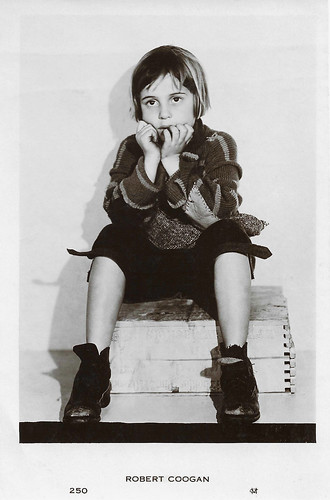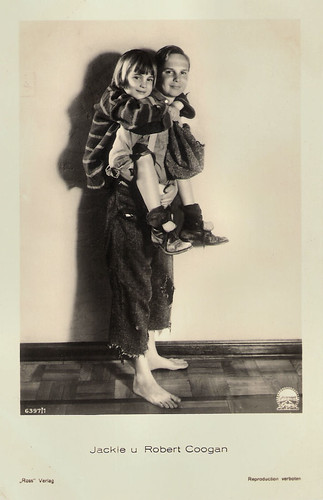
Spanish postcard by CM, no. 250. Sent by mail in 1933.

Spanish postcard by Editorial Fotografica, Barcelona, no. A.186. Photo: Paramount. Robert Coogan, Jackie Cooper, Mitzi Green and Jackie Searl in Skippy (Norman Taurog, 1931). Collection: Marlène Pilaete.

German postcard by Ross Verlag, no. 5992/1, 1930-1931. Photo: Paramount. Robert Coogan in Sooky (Norman Taurog, 1931). Collection: Geoffrey Donaldson Institute.
Paramount Pictures
Robert Anthony Coogan was born in Glendale, California, in 1924. His parents were Jack Coogan Sr. and Lillian Coogan. His older brother was Jackie Coogan, Hollywood's most famous child star of the 1920s.
Starting as a child actor, Robert Coogan made his film debut as Sooky opposite Jackie Cooper and Mitzi Green in Skippy (Norman Taurog, 1931), a comedy-drama family film. The screenplay by Joseph L. Mankiewicz, Don Marquis, Norman Z. McLeod, and Sam Mintz was based on the comic strip 'Skippy' by Percy Crosby. T
he film was a great success, the first film starring children that received three Oscar nominations. The film was nominated for an Academy Award for Best Picture. Director Norman Taurog won the Academy Award for Best Director. Coogan reprised the role of Sooky in its sequel, Sooky (Norman Taurog, 1931), again opposite Jackie Cooper.
The following year, Robert co-starred in the drama The Miracle Man (Norman Z. McLeod, 1932) starring Sylvia Sidney and Chester Morris, and featuring Boris Karloff. It is a remake of the successful silent film The Miracle Man (George Loane Tucker, 1919) starring Lon Chaney.
That year, Coogan also co-starred in the drama Sky Bride (Stephen Roberts, 1932), starring Richard Arlen, Jack Oakie and Virginia Bruce. Sky Bride depicts the life of barnstorming pilots flying in the years following World War I. Again, the screenplay was written by a team of writers that included Joseph L. Mankiewicz. However, Sky Bride was, according to Wikipedia, primarily a B film, and although aerial scenes were notable, it fell short in other aspects. Robert Coogan's budding film career did not take off.

German postcard by Ross Verlag, no. 6397/1, 1931-1932. Photo: Paramount. Jackie Coogan and Robert Coogan.

German postcard by Ross Verlag, Berlin, no. 6896/1, 1931-1932. Photo: Paramount. Jackie Coogan and Robert Coogan.
Monogram Pictures
In addition to his film roles in the early 1930s, Robert Coogan appeared in over one dozen other films and made one appearance in a television production.
After ten years of absence, he returned to the screen in the musical comedy Johnny Doughboy (John H. Auer, 1942) for Republic Pictures. It stars Jane Withers in a dual role as a 16-year-old actress who is sick of playing juvenile roles, and her lookalike fan who is persuaded by a group of "has-been" child stars to perform with them in a U.S. troop show. The film features cameos by ex-child stars Bobby Breen, Our Gang's Carl 'Alfalfa' Switzer and George 'Spanky' McFarland, Baby Sandy, Cora Sue Collins and Robert Coogan. The film received an Academy Award nomination for Best Musical Score.
Coogan continued acting in adulthood, but only with minor success. With Jackie Cooper and his brother Jackie Coogan, he appeared in the comedy Kilroy Was Here (1947) directed by Phil Karlson and written by Dick Irving Hyland for Monogram Pictures. They also appeared in the sequel, French Leave (Frank McDonald, 1948), sometimes known by the alternative title of Kilroy on Deck. At Monogram, he also played a small role in the Horror comedy Master Minds (Jean Yarbrough, 1949), the sixteenth film in the Bowery Boys series.
Robert portrayed the role of Humphrey Pennyworth in the Joe Palooka B-movies, starting with Joe Palooka Meets Humphrey (Jean Yarbrough, 1950). 'Joe Palooka' was a popular comic strip about a heavyweight boxing champion, created in 1930 by cartoonist Ham Fisher. The strip was adapted to a 15-minute CBS radio series, nine Vitaphone film shorts, and a 1954 syndicated television series (The Joe Palooka Story). In 1946, Monogram Pictures launched a series of 11 low-budget films starring Joe Kirkwood, Jr. as Joe, Leon Errol as Knobby and Elyse Knox as Ann Howe. Coogan returned in Joe Palooka in Humphrey Takes a Chance (Jean Yarbrough, 1950) and Joe Palooka in the Squared Circle (Reginald LeBorg, 1950).
In the 1950s, came a few television parts, including, again in a comic vein, that of Adolf Hitler in an episode of General Electric Theatre (1955). He continued to play small roles in films, including an uncredited bit part in the famous cult film The Little Shop of Horrors (1960), a horror comedy directed by Roger Corman about a florist's assistant who cultivates a plant that feeds on human blood. Coogan retired from the screen in the early 1960s. Robert Coogan died in 1978 at the age of 53. Coogan's only child is Jonathan Coogan. Coogan's nephew is the stereographer and 3D producer Anthony Coogan, and his grand-nephew Keith Coogan is also an actor.

Dutch postcard, no. 119. Photo: Paramount.

German postcard by Ross Verlag, no. 7232/1, no. 1932-1933. Photo: Paramount.
Sources: Wikipedia and IMDb.
No comments:
Post a Comment